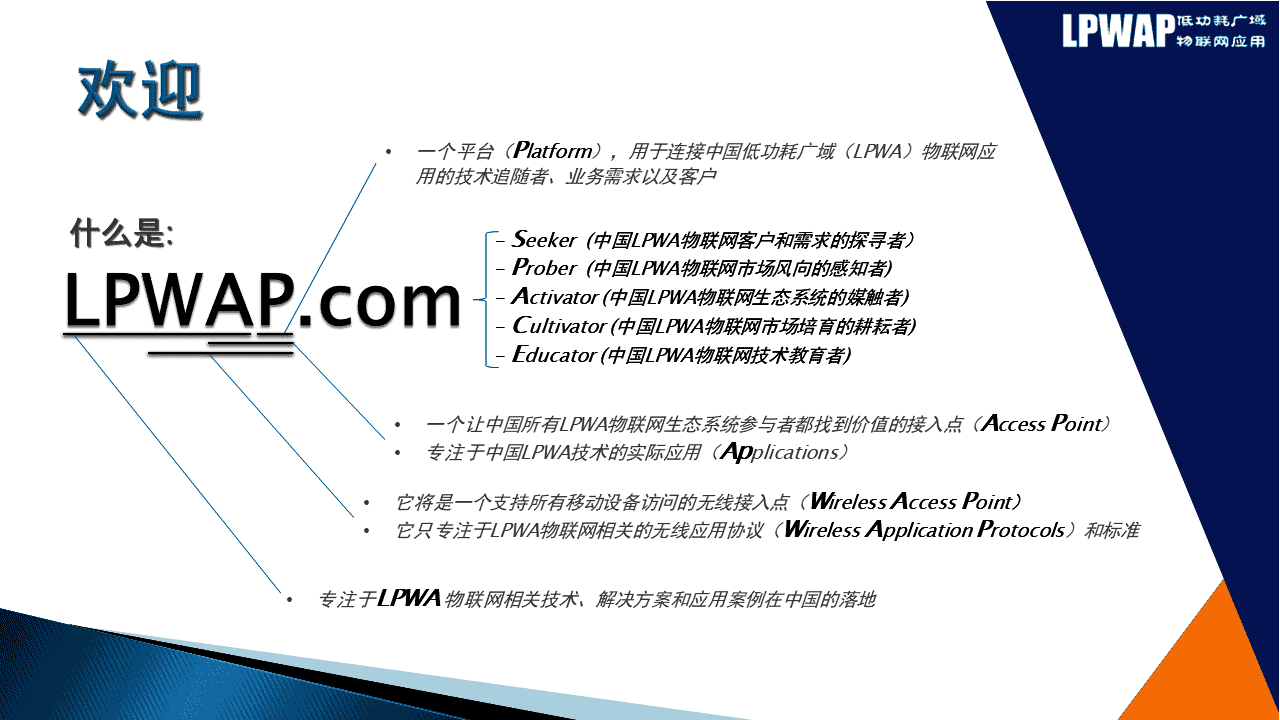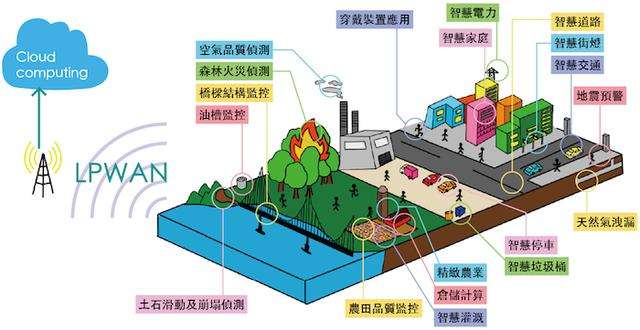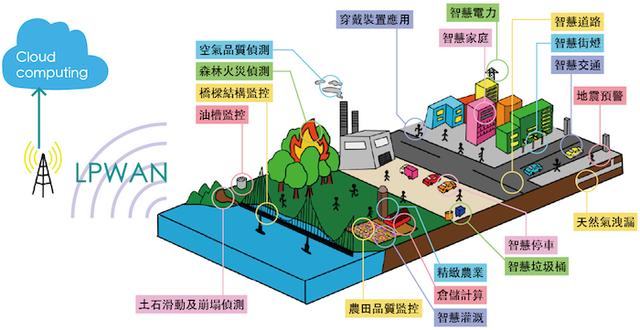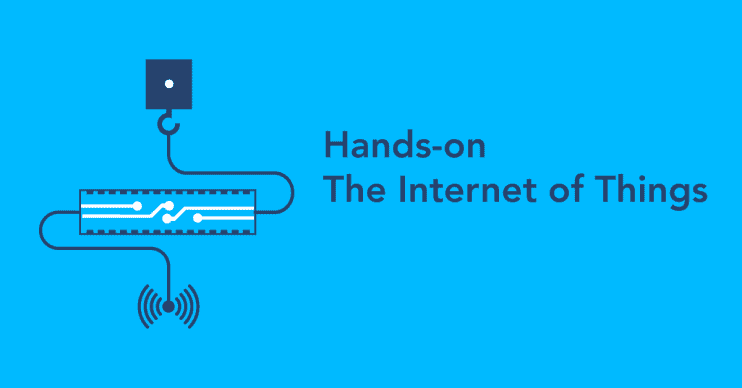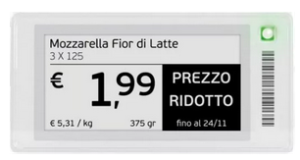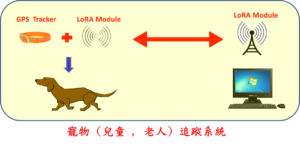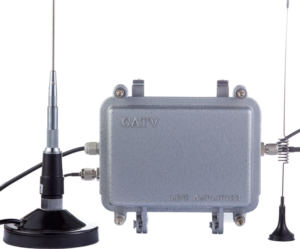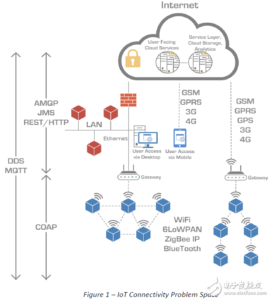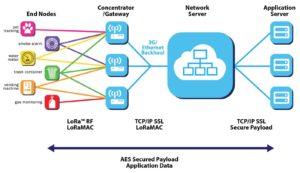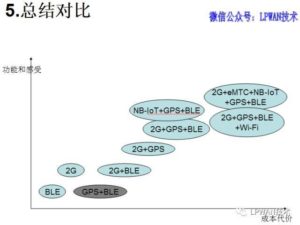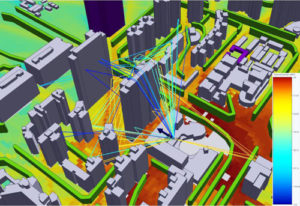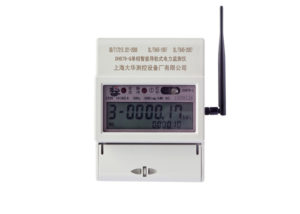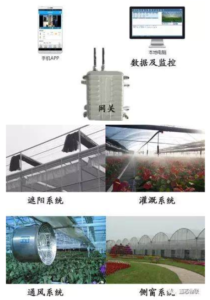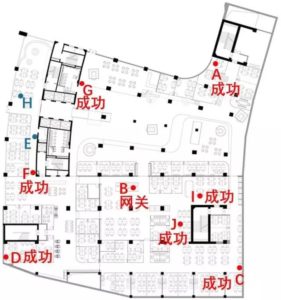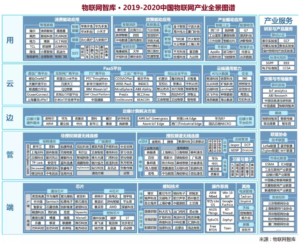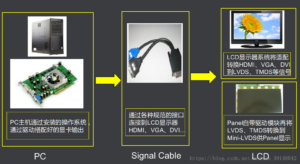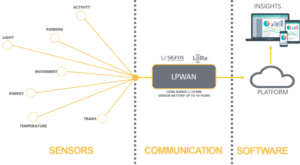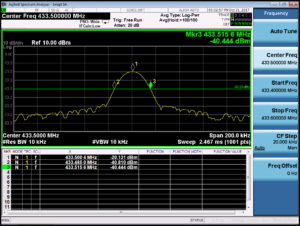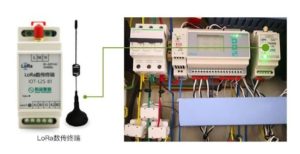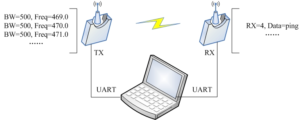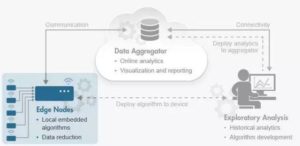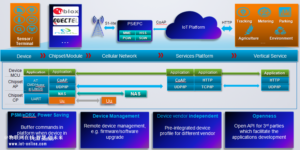LPWA物联网+行业头条
如何看待物联网时代下的电子价签
来源:物联传媒 作者: 短颈鹿先生 自1993年,第一个电子价签在欧洲诞生,电子价签就备受关注,当时由于成本太 […] Read more.
意法半导体为STM32Cube生态系统新增LoRaWAN®固件无线更新支持
中国,2019 年 11 月 7 日——意法半导体增强 STM32 *LoRaWAN®开发软件扩展包(I-CU […] Read more.
全球智能表计将破10亿大关!亚太地区出货量最高,中国领跑|《智能表计市场报告20
来源: IoT Analytics、物联网智库全景动态图谱 物联网市场调研机构IoT Analytics近日发 […] Read more.
基于Semtech LoRa长距离无线技术的GPS追踪应用方案
GPS追踪技术已经开发出很久,也成功地应用在各式各样的应用上。除应用于手机或是汽车导航之外,其他另有追踪物品如 […] Read more.
青海口碑好物联网LORA智能水表优选企业「大华供应」
青海口碑好物联网LORA智能水表优选企业, “上海大华”LORA无线远传水表管理平台包括:账号管理、报装管理、 […] Read more.
选择物联网协议:深入了解LoRa,Cat-M和NB-IoT
选择正确的物联网协议对您企业的物联网项目可能意味着一切。 自1982年第一台非官方的物联网(IoT)设备——卡 […] Read more.
危机即转机,阿里、腾讯入局 LoRa 都做了什么?
6 月 6 日,工信部正式向中国电信、中国移动、中国联通、中国广电发放了 5G 商用牌照。随后,华为、中兴等产 […] Read more.
LoRa在中国最不缺需求和客户,但是缺…
LoRa技术在水表、气表、电表,还有消防、安防有着很大的市场。但是在IoT等新领域是过渡期,今年预估物联网应用 […] Read more.
加快采用LoRaWAN™协议 促进中国公用事业和能源应用
加州菲蒙市 – 2019年4月11 –支持物联网(IoT)低功耗广域网 (LPWANs)开放式LoRaWAN& […] Read more.
LPWA物联网+推荐方案
共享单车智能锁主流方案详细设计及对比
本文来源:物联网时空 在共享单车的带动下,智能锁的需求大幅提升,更多的人开始关注这一领域,那么,它的市场现状, […] Read more.
厦门四信:LoRa、NB-IoT、ZigBee在智慧照明应用中的经验分享
大家好,很高兴今天作为一个重量级的嘉宾压轴登场,是,重量级,大家看体型就知道了。我是厦门四信的产品经理,今天主 […] Read more.
LoRa新型空调安装在屋顶 还可作氛围灯使用
冬天就快过去了,又快要用空调了。一提起空调,我们脑海中就会浮现一个白色的大方盒,长久以来,空调的形状似乎一成不 […] Read more.
凯捷(Capgemini)推动智能建筑转型升级
作为全球领先的技术服务提供商,凯捷(Capgemini)在全球各地使用约400座楼宇,公司知道在实现其严格的企 […] Read more.
解密如何实现LoRa覆盖规划及仿真评估,打造高品质物联网络
2018年腾讯在深圳建设了一个超大规模的LoRa网络,而在这个网络建设中,腾讯基于SIRADEL的无线网络设计 […] Read more.
广西优质物联网LORA智能电表「大华供应」
广西优质物联网LORA智能电表, 早期主产的第一代石英钟控分时电能表。这种电能表通过导线连接石英钟各种不同时段 […] Read more.
亲测西安无人值守停车!方便到颠覆你想象!
开车外出最让人闹心的是什么?停车难?烦人的缴费等待?缴费时找不到零钱…? 为提高城市智能化管理水 […] Read more.
基于LoRa无线传输技术的智慧农业物联网相关应用
对于规模化的温室大棚种植而言,单靠人工管理需要大量人手,耗力费时,并且存在难以避免的人工误差。通过物联网系统, […] Read more.
基于Semtech LoRa技术的智慧城市解决方案缓解交通拥堵
高性能模拟和混合信号半导体及先进算法供应商Semtech Corporation日前宣布:Civic […] Read more.
LPWA物联网+市场风向
【更多…】
干货分享:信锐LoRa方案在P2北京e世界店的测试记录
作者:老韩 来源:格物资讯 之前分享了信锐LoRa方案在3W北京中关村店的测试记录,可 […] Read more.
LPWAN战火不止 封闭区域LoRa更具优势
物联网的通讯标准之争持续延烧,LoRa与Sigfox两大技术的应用领域重迭性相当高,也一直是被相关厂商作为相互 […] Read more.
2019-2020最新版IoT产业图谱深度解析【物女心经】
作者:彭昭 来源:物联网智库 从2016年起,物联网智库每年度都会推出一份物联网IoT产业生态全景图谱。201 […] Read more.
2019年物联网趋势预测:NB-IoT与LoRa将共同发展,并将实现平台化
2018年物联网进入全面发展的阶段,三大运营商在物联网领域的成果纷呈,芯片模组厂商也在重力急推。根据中国通信院 […] Read more.
Semtech以新一代LoRa平台支持物联网未来发展
全新的芯片组系列产品扩大了网络覆盖范围同时将功耗降低了50%,从而使LoRa成为了低功耗广域网络(LPWAN) […] Read more.
从IoT World 2019看全球IoT发展趋势:LPWAN将是更廉价更巨大I
作者:张国斌 (发自美国硅谷圣克拉拉) 美国时间5月14日,IoT World2019在美国硅谷圣克拉拉会议中 […] Read more.
Semtech表示已在捷克部署LoRaWAN网络
Semtech宣布Ceske Radiokomunikace (CRA)捷克电信公司提供商业物联网,并且部署了 […] Read more.
慧联无限联合创始人涂帆:1.5亿B轮融资发力智慧社区
4月2日消息,低功耗广域解决方案提供商——慧联无限(EasyLinkin)正式对外宣布完成1.5亿B轮融资。本 […] Read more.
Sigfox、LoRaWAN、NB-IoT在澳洲水务市场的应用
[导读]澳洲水务智能计量专家Rian Sullings分享了新型无线通信技术LPWAN在澳大利亚智能水计量项目 […] Read more.
LPWA物联网+推荐企业
【更多…】
广州致远电子有限公司
致远电子专注于电子行业,坚持以用户为中心,基于用户需求持续创新,赢得了用户的尊重和信赖。如今,我们的工业控制设 […] Read more.
特斯联(北京)科技有限公司
特斯联(北京)科技有限公司是由中国光大旗下基金与IDG资本联合投资的城市级移动物联网生态平台公司,领跑于以物联 […] Read more.
深圳市安美通科技有限公司
深圳市安美通科技有限公司是一家专业从事自动化和无线通信产品的研发、生产、销售、工程和服务的综合性高科技企业。 […] Read more.
江苏星宇芯联电子科技有限公司
江苏星宇芯联电子科技有限公司是国内领先的卫星定位领域的专家型企业,专门从事射频、模块终端研制和销售的高科技公司 […] Read more.
深圳洲斯移动物联网技术有限公司
深圳洲斯移动物联网技术有限公司(以下简称ZKS洲斯物联),在“互联网+”浪潮下坚持创业、持续创新,始终以人的生 […] Read more.
思科系统公司
思科公司是全球领先的网络解决方案供应商。Cisco的名字取自San Francisco(旧金山),那里有座闻名 […] Read more.
宁波艾玛特仪表科技有限公司
1996年成立的宁波海曙永生仪表厂,是国内较早专注于水表及零配件研发、生产、销售企业之一,产品销售使用遍及国内 […] Read more.
美国微芯科技公司/Microchip Technology Trading (S
Microchip Technology Incorporated(纳斯达克股市代号:MCHP)是全球领先的单 […] Read more.
上海铭控传感技术有限公司
上海铭控传感技术有限公司是铭动科技(MIND)旗下专门从事压力传感器、压力开关、压力控制器、数字压力表等压力测 […] Read more.
LPWA物联网+推荐专利
【更多…】
路灯充电桩及其停车位管理方法、装置和系统
公开号 CN106781644 A (PDF专利下载) 发布类型 申请 专利申请号 CN 2016110361 […] Read more.
一种抄表台区用电信息综合普查仪
公开号 CN106652425 A (PDF专利下载) 发布类型 申请 专利申请号 CN 2016109678 […] Read more.
天然气井远程采集系统
公开号 CN106089299 A (PDF专利下载) 发布类型 申请 专利申请号 CN 2016104452 […] Read more.
用于智能穿戴设备的计数系统
公开号 CN205942774 U (PDF专利下载) 发布类型 授权 专利申请号 CN 2016207992 […] Read more.
LoRa信号与蓝牙信号转换模块、转换方法及信号发送装置
公开号 CN106162528 A (PDF专利下载) 发布类型 申请 专利申请号 CN 2016105274 […] Read more.
一种LoRaWAN处理多网关数据重复发送的方法
公开号 CN106851735 A (PDF专利下载) 发布类型 申请 专利申请号 CN 2017101238 […] Read more.
一种自适应抄表的多表集抄通信接口转换器
公开号 CN206460606 U (PDF专利下载) 发布类型 授权 专利申请号 CN 2017200020 […] Read more.
工程钻机机器人无线远程电液遥控系统
公开号 CN106996290 A (PDF专利下载) 发布类型 申请 专利申请号 CN 2017103824 […] Read more.
一种通用式燃气表连接模板
公开号 CN205958050 U (PDF专利下载) 发布类型 授权 专利申请号 CN 2016209921 […] Read more.
LPWA实验室学习资料
【更多…】
物联网之LoRa开发与应用三(LoRa人机界面开发)
文章要点: 1、TFT液晶屏工作原理 2、TFT液晶屏驱动开发 3、TFT人机界面开发 TFT液晶屏工作原理 […] Read more.
IoT应用/装置数量飞速成长 认识LPWAN发展刻不容缓
物联网(IoT)发展需要长距离的通讯,进而催生出低功耗广域网络技术(LPWAN)的问世。 事实上,LPWAN一 […] Read more.
物联网低功耗广域网络(LPWAN)技术全面详解
物联网希望通过通信技术将人与物,物与物进行连接。在智能家居、工业数据采集等区域网通信场景一般采用 […] Read more.
Semtech发布基于LoRa的解决方案以简化物联网应用
2019年3月19日,高性能模拟和混合信号半导体产品及先进算法领先供应商Semtech Corporation […] Read more.
433MHz LoRa/FSK 无线频谱波形分析(频谱分析仪测试LoRa/FSK
1、测试环境 频谱分析仪:安捷伦N9020A 无线通信频段:433M Hz 射频芯片:Sx1278 天线:43 […] Read more.
快速了解LoRa模块的技术内涵
随着物联网技术的发展,许多物联网技术涌现出来,其中应用较为广泛的技术还是lora技术,lora模块在各行业里的 […] Read more.
LoRa的带宽、频率测试
一、测试目的 跳频是抵抗外部干扰和多径衰退的好方法,它将频率分成一个个单独的物理信道。LoRa无线通信也不例外 […] Read more.
从边缘计算到边缘智能 还有多少“边缘”的路要走?
Edge Computing(边缘计算)这个酷概念虽然正逐渐被人熟知,但在应用领域却刚刚起步。随着越来越多的工 […] Read more.
华为NB-IoT物联网开放开发指南
基于蜂窝的窄带物联网(Narrow Band Internet of Things, NB-IoT)成为万物互 […] Read more.
LPWA实验室学习视频
【更多…】
LoRa在线视频课程01-LoRa技术概述(主讲:甘泉)
【如果您的浏览器不支持直接播放下列视频,可以点击此处下载播放】 课程名称:LoRa技术概述(LoRa在线视频课 […] Read more.
LoRa在线视频课程02-LoRa市场及应用概述(主讲:甘泉)
【如果您的浏览器不支持直接播放下列视频,可以点击此处下载播放】 课程名称:LoRa市场及应用概述(LoRa在线 […] Read more.
LoRa在线视频课程03-LoRaWAN介绍(主讲:甘泉)
【如果您的浏览器不支持直接播放下列视频,可以点击此处下载播放】 课程名称:LoRaWAN介绍(LoRa在线视频 […] Read more.
LoRa在线视频课程04-LoRaWAN生态(主讲:甘泉)
<p>【如果您的浏览器不支持直接播放下列视频,可以点击此处<a href=”ht […] Read more.
LoRa在线视频课程05-LoRaWAN第5期课程(主讲:甘泉)
【如果您的浏览器不支持直接播放下列视频,可以点击此处下载播放】 课程名称:LoRaWAN第5期课程(LoRa在 […] Read more.
LoRa在线视频课程06-LoRa室内应用(主讲:甘泉)
【如果您的浏览器不支持直接播放下列视频,可以点击此处下载播放】 课程名称:LoRa室内应用(LoRa在线视频课 […] Read more.
LoRa在线视频课程07-LoRa硬件芯片、调制、测试(主讲:甘泉)
【如果您的浏览器不支持直接播放下列视频,可以点击此处下载播放】 课程名称:LoRa硬件芯片、调制、测试(LoR […] Read more.
LoRa在线视频课程08-LoRa定位技术、IOTE回顾(主讲:甘泉)
【如果您的浏览器不支持直接播放下列视频,可以点击此处下载播放】 课程名称:LoRa定位技术、IOTE回顾(Lo […] Read more.
LoRa在线视频课程09-LoRa创新应用总结、信道容量、工作距离、电量计算(主
【如果您的浏览器不支持直接播放下列视频,可以点击此处下载播放】 课程名称:LoRa创新应用总结、信道容量、工作 […] Read more.

